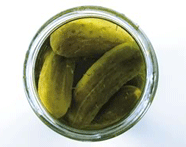Cravings Fact or Fiction?

Fact or fiction?
The can’t-get-it-out-of-your-head craving. You just sent your partner out for a triple-fudge sundae and a super-sized bag of dill pickle potato chips. It would seem that you’ve been hit with the modern-day equivalent of that classic pickles and ice cream craving!
But as you rip open the bag of chips and dive into that ultra-decadent triple-fudge sundae, you can’t help but wonder how much of your craving is physiological in nature and how much is psychologically based. After all, those ice cream sundae cravings have been part of your life for as long as you can remember. It’s just the dill pickle potato chip compulsion that’s a more recent twist!
You aren’t the only one asking tough questions about food cravings. Even the experts have difficultly agreeing about what causes them. While some tend to pooh-pooh the whole idea of food cravings during pregnancy entirely, others have tried to make the case that food cravings are Mother Nature’s way of ensuring that you and your baby get the nutrients you need. If you’re calcium-deficient, for example, you should be hit with a powerful craving for cheese.
While hard facts about food cravings can be a little difficult to pin down, there have been a few studies done over the years about food cravings and food aversions during pregnancy. (Food aversions are, of course, the flip side of food cravings – those foods you simply can’t imagine ever wanting to eat again!) Here’s what some of the key studies have revealed to date.
A study reported in the February 2002 issue of the medical journal Appetite concluded that food cravings are more common than food aversions, affecting 61 percent as opposed to 54 percent of pregnant women. And while there is a strong link between food aversions and morning sickness (the researchers found that food aversions and morning sickness symptoms tend to kick in at the same point in pregnancy), they weren’t able to identify any such link between food cravings and morning sickness.
A study reported in the December 1992 issue of Appetite found that women are more likely to crave sweet foods during the second trimester than at any other point in pregnancy. The researchers also concluded that food cravings are not entirely physical in origin: that there are a complex mix of psychological, behavioural and physiological factors involved. So don’t feel like you’re totally powerless to resist the call of that triple fudge sundae. According to this particular study, it’s powerful to exercise mind over matter in so far as food cravings are concerned.
A study reported in the August 1978 issue of The American Journal of Clinical Nutrition found that ice cream, sweets, candy (especially chocolate), fruit and fish are the most commonly craved foods during pregnancy.
But don’t get too excited just yet. That’s pretty much all that the experts agree on! They tend to belong to one of two conflicting schools of thought. One school believes that pregnant women develop food cravings because they think they’re supposed to develop them. After all, that late-night trip to the convenience store to satisfy a pregnant woman’s craving for pickles and ice cream is pretty standard sitcom fare.
The other school makes the case that the hormonal changes of pregnancy can cause certain foods to taste much worse and much better than normal – a physiological factor that may be at the root of many food cravings during pregnancy.
But regardless of what’s triggering these food cravings, it’s important to know how to respond when every cell in your body starts screaming for ice cream. You don’t have to say no each and every time, but be aware that if you say yes too often, you’ll be left with some unwelcome souvenirs of your pregnancy on your hips and thighs. That should leave you with plenty of food for thought.
Ann Douglas is an award-winning writer and author of numerous books about pregnancy and parenting including the newly published Sleep Solutions for Your Baby, Toddler, and Preschooler and Mealtime Solutions for Your Baby, Toddler and Preschooler. Visit www.having-a-baby.com



